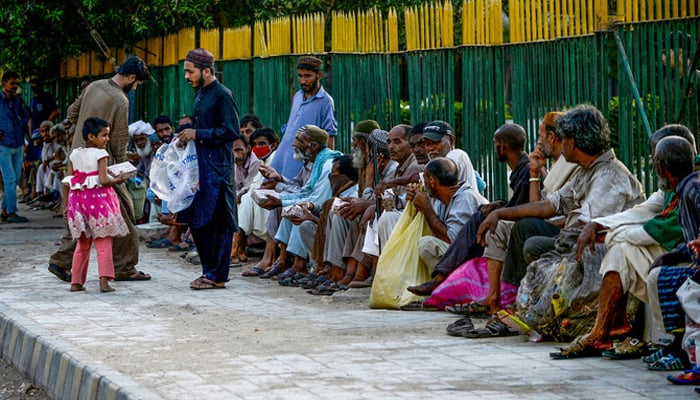Two-pronged approach
LAHORE: Progress in poverty reduction in Pakistan is measured primarily in terms of consumption or income, ignoring the other aspects of life that are also critical for well-being of human beings facing income poverty.
Given the current situation in Pakistan, it seems almost impossible to increase the incomes of the poor, at least in the medium-term, simply because we lack material resources. However, many hidden aspects of poverty could be immediately addressed without any resources.
We only need to change our attitude towards the poor. They should at least be allowed to speak their minds out by inviting them to social gatherings exclusive to the affluent or influential only.
UN Special Rapporteur on extreme poverty and human rights, Olivier De Schutter, at a UN General Assembly session, has said that as the global rise in energy and food prices throws millions more into poverty, they must be protected not just from the horrors of poverty, but also from the humiliation and exclusion caused by the scourge of povertyism.
The term Povertyism has recently been added to relates to negative attitudes and behaviours towards people living in poverty. In fact, according to the UN expert on poverty, it is as pervasive, toxic and harmful as racism, sexism and other forms of discrimination and should be treated as such.
The research conducted by the UN experts in various countries reveals cases where children from low-income families have been refused access to certain schools, employers have judged CVs more harshly when the address suggests the person lives in poverty, and landlords have refused to rent apartments to tenants receiving social benefits.
Even judges have been found to hand out harsher sentences based on anti-poor stereotypes. Unfortunately, these behaviors by society in general are common in Pakistan.
Even a grade 17 officer is looked down on by some high ranked bureaucrats, making him feel inferior. These officers forget that they started their careers from the same point. Low cadre employees or poor seeking their rightful services are humiliated with impunity. Now most of the world knows that poverty is multidimensional. Earlier, experts like Adam Smith referred to dimensions subtly as the basis of self-respect and the importance of being able to “appear in public without shame.”
Amartya Sen, advancing in formalization, brought the notion of “functionings” as the “beings and doings” effectively available to people in their capability set, so they can “pursue the life plans they have reasons to value.”
The hidden dimensions of poverty include aspects related to emotions that trigger behavioral responses: feelings of isolation, discrimination, effects on the sense of dignity and self-respect, and disempowerment. Our actions to tackle povertyism and to understand the complex interactions between dimensions still remain underdeveloped.
Since 2018, the World Bank’s multidimensional poverty measure has gone beyond monetary deprivation to include other dimensions such as access to education, health, nutrition, and basic infrastructure services.
The identified dimensions included a lack of decent work or income, of course, but also feelings of powerlessness, lacking control, and experiencing “povertyism” (negative attitudes and behaviors toward people living in poverty).
The state of Pakistan should at least restore the dignity of the poor by providing them a level playing field in education. In this regard, the curriculum of all schools, whether private or public, should be the same (in fact, in line with the curriculum of the best private school). This will ensure equality in education. The government hospitals and clinics should attend to all the patients that enter their premises within office time. The present practice of leaving patients unattended when official time is over should be stopped. The head of the out-patient ward must sit till every patient is attended to. This would empower the poor who would not have to waste days in getting the treatment.
-
 All You Need To Know Guide To Rosacea
All You Need To Know Guide To Rosacea -
 Princess Diana's Brother 'handed Over' Althorp House To Marion And Her Family
Princess Diana's Brother 'handed Over' Althorp House To Marion And Her Family -
 Trump Mobile T1 Phone Resurfaces With New Specs, Higher Price
Trump Mobile T1 Phone Resurfaces With New Specs, Higher Price -
 Factory Explosion In North China Leaves Eight Dead
Factory Explosion In North China Leaves Eight Dead -
 Blac Chyna Opens Up About Her Kids: ‘Disturb Their Inner Child'
Blac Chyna Opens Up About Her Kids: ‘Disturb Their Inner Child' -
 Winter Olympics 2026: Milan Protestors Rally Against The Games As Environmentally, Economically ‘unsustainable’
Winter Olympics 2026: Milan Protestors Rally Against The Games As Environmentally, Economically ‘unsustainable’ -
 How Long Is The Super Bowl? Average Game Time And Halftime Show Explained
How Long Is The Super Bowl? Average Game Time And Halftime Show Explained -
 Natasha Bure Makes Stunning Confession About Her Marriage To Bradley Steven Perry
Natasha Bure Makes Stunning Confession About Her Marriage To Bradley Steven Perry -
 ChatGPT Caricature Prompts Are Going Viral. Here’s List You Must Try
ChatGPT Caricature Prompts Are Going Viral. Here’s List You Must Try -
 James Pearce Jr. Arrested In Florida After Alleged Domestic Dispute, Falcons Respond
James Pearce Jr. Arrested In Florida After Alleged Domestic Dispute, Falcons Respond -
 Cavaliers Vs Kings: James Harden Shines Late In Cleveland Debut Win
Cavaliers Vs Kings: James Harden Shines Late In Cleveland Debut Win -
 2026 Winter Olympics Snowboarding: Su Yiming Wins Bronze And Completes Medal Set
2026 Winter Olympics Snowboarding: Su Yiming Wins Bronze And Completes Medal Set -
 Trump Hosts Honduran President Nasry Asfura At Mar-a-Lago To Discuss Trade, Security
Trump Hosts Honduran President Nasry Asfura At Mar-a-Lago To Discuss Trade, Security -
 Cuba-Canada Travel Advisory Raises Concerns As Visitor Numbers Decline
Cuba-Canada Travel Advisory Raises Concerns As Visitor Numbers Decline -
 Anthropic Buys 'Super Bowl' Ads To Slam OpenAI’s ChatGPT Ad Strategy
Anthropic Buys 'Super Bowl' Ads To Slam OpenAI’s ChatGPT Ad Strategy -
 Prevent Cancer With These Simple Lifestyle Changes
Prevent Cancer With These Simple Lifestyle Changes




